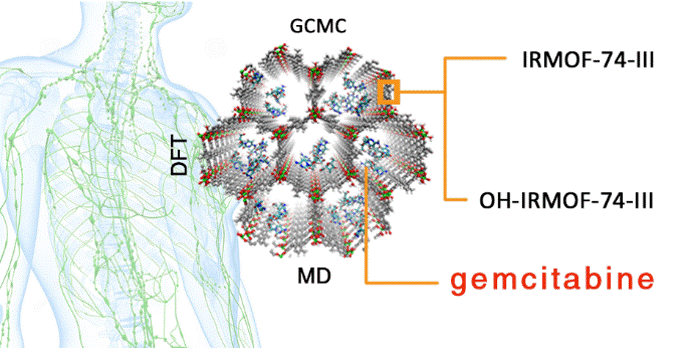Drug Delivery
Anti-cancer drug

Metal-Organic Frameworks (MOFs) have been recently used as potential nanocarrier platforms in biomedical applications such as drug storage and delivery, due to their low toxicity, biodegradability, high internal surface area, widely tunable composition, high payloads and controlled drug release.
In our group we use computational techniques that have been performed to study anti-cancer drug delivery in MOFs. Computational simulations can offer a unique insight into the drug adsorption and diffusion mechanisms in porous nanocarriers at the atomic level, since a clear molecular-level understanding is important for the development of novel drug delivery systems with better control of drug administration. The calculated drug loading capacities of the reported MOFs are in good agreement with the experiments, making these materials promising for drug storage with exceptional payloads. The simulations also revealed a slow drug release rate for the stated MOFs, reducing the side effects of the traditional medication and thus improving the life expectancy of the patients affected by cancer.
This research will be useful to identify the most auspicious MOFs in cancer therapy prior to experimental studies and to effectively design smart nanocarriers able to deliver chemotherapeutics specifically to the damaged cells and to release them in a controlled way, offering a primary virtue over conventional therapy.
References
[1] “Multiscale simulations reveal IRMOF-74-III as a potent drug carrier for gemcitabine delivery”, Kotzabasaki, M.; Galdadas, I.; Tylianakis, E ; Klontzas, E.; Cournia, Z.; Froudakis, G.E.;, JOURNAL OF MATERIALS CHEMISTRY B, 5 (2017) 3277-3282
[2] “OH-functionalization strategy in Metal-Organic Frameworks for drug delivery”, Kotzabasaki, M.; Tylianakis, E ; Klontzas, E.; Froudakis, G.E.;, Chemical Physics Letters 685 (2017) 114-118
[3] “Review of computer simulations on anti-cancer drug delivery in MOFs”, Kotzabasaki, M.; Froudakis, G.E.;, Inorganic Chemistry Frontiers 5 (2018) 1255-1272

